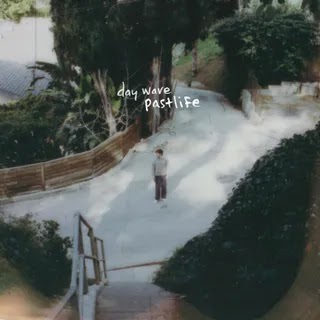Hewing faithfully to Jackson Phillips’ characteristically crisp, concise guitar pop, Pastlife is a coming-of-age album for 30-year-olds, concerned with newfound commitments and misbegotten ambitions.
Listen to any given Day Wave song and you’re bound to hear the same tried-and-true formula, save for a tweak or two: sparkly guitar riffs, galloping drums, and hazy vocals that convey delight even when the writing betrays otherwise. When Bay Area native Jackson Phillips released his debut EP, Headcase, in 2015, his alt-rock influences floated so close to the surface that it was hard to say what, exactly, differentiated him from all the other bands who emulated New Order, Phoenix, and the Radio Dept. In the following years, Day Wave’s work became sharper and more detail oriented, but Phillips rarely diverted from his signature sound; 2015’s “Drag” and 2020’s “Potions,” for instance, could be mistaken for the same song. Phillips’s guitar pop has progressed in a straight line—a sing-along hook here, a set of ohs and ahs there, a looped guitar riff that refuses to noodle outside the lines—and even after collaborating with Saba and producing an album for Pete Yorn, he doesn’t seem all that interested in making songs that veer too far from his playbook.
His new album, Pastlife, nearly perfects the Day Wave formula while also taking a few much-needed risks. It’s a gorgeous, energetic record full of tight, concise melodies and unsentimental lyrics. Phillips’ voice is occasionally gilded with a sheen of fuzz; layers of guitars unfold in rich, legible patterns. But although each song sounds excellent on its own, the album relapses into the same safe structures again and again.
Much of Phillips’ early work centered on nostalgic longings and flailing relationships, and though there’s still plenty of that here, his focus has shifted. Pastlife is a coming-of-age album for 30-year-olds, mostly concerned with newfound commitments and misbegotten ambitions. “So much for finding our way/Arguing into the day/And I don’t know what’s left to chase,” he sings on “Blue,” which sounds like an early Alex G demo. One of the album’s best songs, “Loner,” looks at the complicated nature of letting go: “You locked onto something that would make you feel alive/But it never stays.” Despite his lament, the crisp acoustic guitar and sinewy fingerpicking give the impression that he’s gazing calmly into the source of his suffering, smiling despite the strain of it all.
The music’s simplicity suits Phillips’ straightforward writing. As ever, the songs are built from breezy guitar licks and snappy, uptempo drums. The record’s at its most compelling when Phillips makes minor alterations to his blueprint. “Before We Knew” includes a chanted chorus perfect for screaming at a show, while “Where Do You Go” features lush harmonies and subtle adlibs. But in the album’s second half, the chippy snares and bright guitars begin to wear thin. For an artist with such tight control over his production, Phillips could benefit from a little messiness—a surprise sound, an unexpected switch in tempo, anything to break the songs free from their geometric rigidity.
One of the few moments where Phillips tries something new is on “Great Expectations,” an elegant acoustic song that’s reminiscent of Carrie & Lowell-era Sufjan Stevens. Reversed synths and fingerpicking slink behind doubled guitars as Phillips sings some of the album’s most poignant lyrics: “Seems to be I’m not anything I wanted.” Languishing in self-pity is a temporary fix, though, and soon he’s back to pondering where the hell his life’s going. Confronted with the scary unknown, he opts for comfort: cuddling safely into the well-worn type of song he clearly loves to play, even after he’s wrung every iteration of it dry.









%20Music%20Album%20Reviews.webp)






0 comments:
Post a Comment